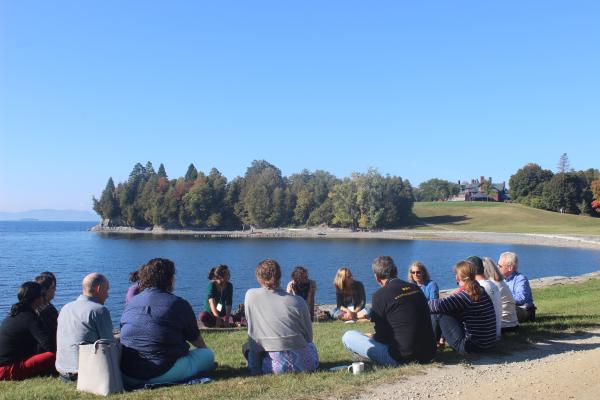A Look into Our Work with Educators
We asked Director of Professional Development Jen Cirillo about why we work with educators in the summer (and all year long), and what they’re actually doing when they’re learning to “Educate for Sustainability.”
What is professional development?
It’s learning skills or content that help you do your job better. In the case of teaching, it’s what will help you be a stronger teacher to meet the diverse needs of your students.
What does it look like at the Farm?
We support teachers in doing place-based learning around sustainability and farm to school. But it doesn’t look like traditional lecturing to just deliver information. Here, you’ll often see educators out on the land or sitting in a circle in deep conversation.
What are teachers doing?
Typically, they’re reflecting on their teaching practice in light of something we’re reading or experiencing. Like we’ll read case studies about place-based learning that a teacher might adapt to their classroom, or readings around power, privilege, and poverty that get at an educator’s personal values behind their teaching.
Is it simply a discussion?
Yes, but it’s guided, usually. We often use protocols — or tools — to do this. A good example is the Four A’s (see below). This protocol is great because it ends in action! Teachers aren’t just navel-gazing. They ask “What does this mean for my students? For my colleagues?” They leave with next steps. For instance, we had a reading about poverty one year, and it led a teacher to set up her own research project around how poverty impacts learning, and what different teaching techniques she could use to work with kids in poverty.
Why does Shelburne Farms do professional development?
To have a greater impact. You work with one educator and you’ve essentially worked with hundreds of kids over that teacher’s career.
What draws teachers to the Farm?
We hear a lot about being with “likeminded professionals.” I would say every educator is in the field of education because they care deeply about students and student learning. I think what our educators share beyond that is a belief that education is the way to make the world a better place.
What role does this campus play?
All the educators say that this campus makes sustainability come alive. And they learn about the big ideas of sustainability, like systems or diversity, because they’re modeled here. It’s just a magical, restorative place. Maybe it’s in the water! Teachers can just let their guard down and let the learning happen.
What impacts do you see?
We want teachers to leave knowing that they can make a difference. I hear from them about “the shift in my practice” or “I’m comfortable pushing for outdoor time now.” We have one young educator — three years into her career — who’s now taking a leadership role in her school’s farm to school work. She looked around and said, “Well, if not me, who’s going to do it?” And she jumped in.
What are you most looking forward to this summer?
As an extrovert, I always like meeting new people! We’ve got some new programs, too, and I always get excited at the start of something. And it’s the 10th anniversary of the Education for Sustainability Institute. That feels like a big milestone to celebrate.
The Four A’s Protocol
To explore a text deeply in light of your own values and intentions, ask:
- What Assumptions does the author hold?
- What do you Agree with?
- What do you want to Argue with?
- What parts of the text do you want to Aspire to (or Act upon)?
